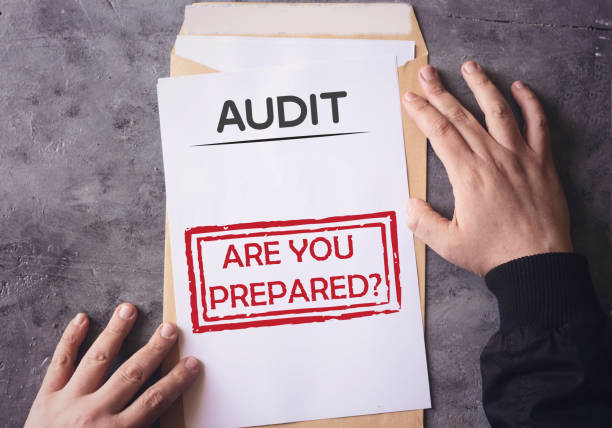Are You Truly Audit-Ready?

Regulatory audits are not just routine procedures—they are compliance checkpoints that determine your business’s credibility, sustainability, and legality. Yet, many organizations are caught off guard, exposing themselves to penalties, legal issues, and damaged reputations.
This blog delivers a comprehensive roadmap for any business looking to get ahead of audits, avoid risks, and maintain full compliance.
In This Guide, You will Learn:
- The importance of regulatory audit preparation
- What triggers an audit and how to recognize the signs
- What auditors typically look for
- The role of internal controls in audit readiness
- Why expert support is essential
- A step-by-step checklist to get started today
Why Regulatory Audit Preparation Matters
Every business is subject to audit, whether by the Federal Inland Revenue Service (FIRS), state tax authorities, industry regulators, or compliance bodies like PENCOM, NSITF, or ITF. Unfortunately, many businesses do not prioritize audit preparedness until it is too late. They scramble for documents, correct past errors under pressure, and often end up paying heavy penalties.
Failure to prepare adequately can result in:
- Hefty penalties and back taxes
- Suspension of operations
- Loss of licenses or permits
- Reputational damage
- Difficulty in securing financing or partnerships
Proactive regulatory audit preparation saves your business time, money, and legal trouble.
Common Audit Triggers
Regulatory agencies often target businesses for audit based on red flags, which include:
1. Irregular Tax Filings
Late submissions or inconsistencies in PAYE, VAT, or Company Income Tax (CIT) filings send up red flags.
2. Payroll or Pension Irregularities
Failure to remit contributions to NSITF, NHF, or PENCOM consistently may trigger reviews.
3. Operating Without Proper Licenses
Businesses without up-to-date CAC filings, trade licenses, or sector-specific certifications are more likely to be flagged.
4. Internal Complaints or Whistleblowers
Former employees or vendors may alert regulators if they suspect non-compliance.
5. Random Selections
Regulators also audit companies randomly to maintain standards across the board.
Note: If you have missed a deadline or remitted inconsistent amounts—expect a knock at your door.
What Do Auditors Typically Look For?

Understanding audit scope helps you prepare documentation in advance. Auditors focus on five major areas:
1. Financial Statements
Are your books balanced and records up to date? Auditors will assess:
- Profit & loss accounts
- Cash flow statements
- Ledgers and journals
- Expense justifications
2. Payroll and Employment Records
They check:
- PAYE and pension contributions
- Employee tax deduction accuracy
- NSITF, ITF, and NHF compliance
3. Regulatory Filings
- CAC annual returns
- Business registration updates
- Required licenses, industry permits, and environmental compliance
4. HR Records
- Valid employment contracts
- NDAs, onboarding paperwork
- Employee benefit deductions and policies
5. Internal Controls and Governance
- Authorization processes
- Role segregation and accountability
- Audit trails and approval workflows
Top Areas of Non-Compliance
Businesses often fall short in the following areas:
- Incomplete or outdated financial records
- Unfiled tax returns
- Irregular payroll remittances
- Poor segregation of duties
- Failure to retain supporting documents
- Lack of standard operating procedures
These weaknesses are red flags for regulators and can lead to investigations, penalties, or legal action.
The Role of Expert Audit Assistance
Trying to handle a regulatory audit internally, especially without experience, can be overwhelming. Expert support helps businesses:
- Conduct internal pre-audit reviews
- Identify and correct compliance gaps
- Compile and organize necessary documentation
- Provide staff training for audit interviews
- Liaise with regulatory bodies during the audit process
- Implement internal controls post-audit
Step-by-Step Regulatory Audit Preparation Checklist

Here is how to begin your preparation today:
| Task | Description |
| Document Review | Verify all financial and payroll records |
| Reconcile Taxes | Cross-check PAYE, VAT, and WHT remittances |
| Review CAC Filings | Ensure your annual returns and updates are current |
| Assess Licenses | Confirm all permits and sector certifications are valid |
| Check Internal Controls | Review access restrictions and approval workflows |
| Train Staff | Educate team on compliance protocols and what to expect during an audit |
| Get Expert | Help Schedule a professional audit consultation |
How Internal Controls Strengthen Audit Readiness
Strong internal controls make you audit-resilient by:
- Preventing fraud
- Ensuring accountability
- Providing paper trails for all financial transactions
- Enhancing transparency
Implement policies like:
- Dual approval for large payments
- Restricted access to financial software
- Monthly bank reconciliations
- Automated backups of ledgers and statements
Why You Need Professional Help Before the Audit Notice Arrives
Most companies only reach out for help after receiving a notice. But the smartest businesses partner with experts early to avoid the panic, errors, and rushed documentation that usually follow an audit notice.
An audit professional helps you:
- Minimize risk
- Maximize preparedness
- Avoid fines
- Strengthen operational efficiency
Benefits of Audit Preparation with Expert Support
- Avoid penalties and interest charges
- Build a defensible compliance record
- Improve financial visibility and control
- Protect your brand and business reputation
- Reduce future audit frequency through clean results
Ready to Be Audit-Proof?
Whether you are preparing for a FIRS review, NSITF inspection, or a PENCOM compliance check, expert guidance ensures you’re never caught off guard.
That is where Wells Accounting & Tax Services comes in.
We specialize in:
- Regulatory audit preparation
- Internal control systems
- Payroll compliance
- Documentation and CAC support
- Liaison with government agencies
Call us today at +234 081-7801-1853
Email: info@wellsaccountingtax.com
Visit: www.wellsaccountingta.com
Let us help you make compliance a strength—not a source of stress.

